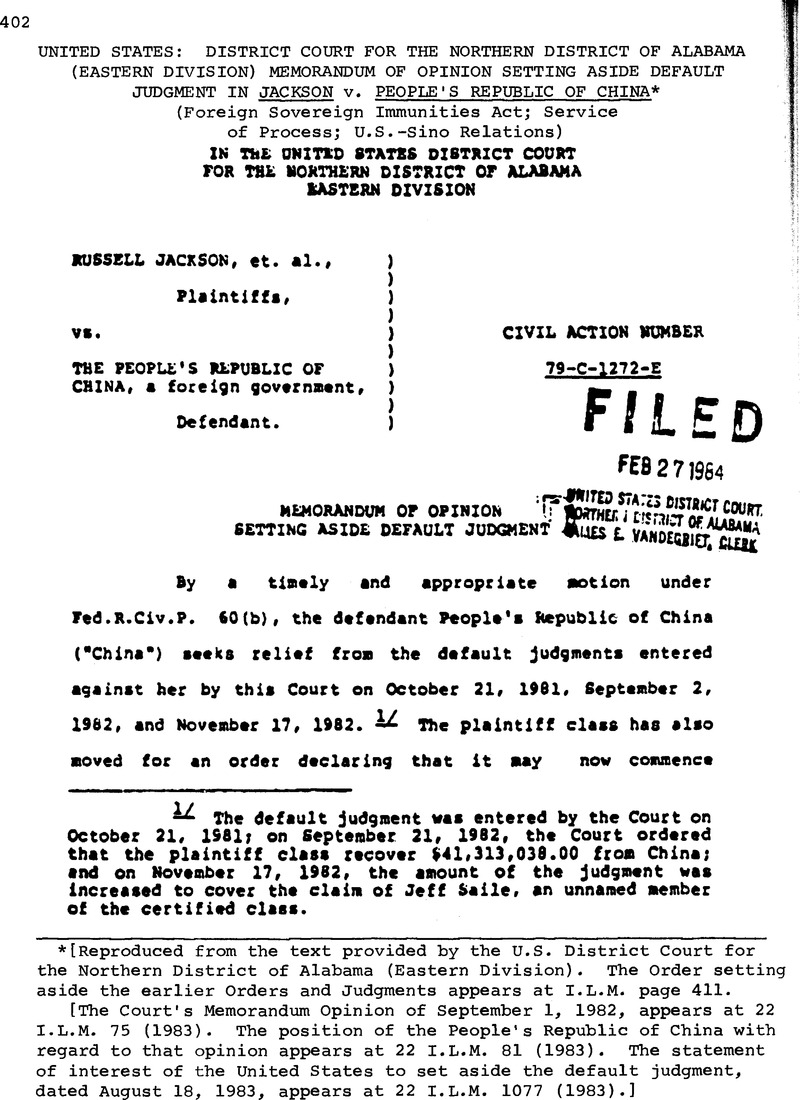No CrossRef data available.
Article contents
United States: District Court for the Northern District of Alabama (Eastern Division) Memorandum of Opinion Setting Aside Default Judgment in Jackson v. People's Republic of China (Foreign Sovereign Immunities Act; Service of Process; U.S.-Sino Relations)*
Published online by Cambridge University Press: 04 April 2017
Abstract

- Type
- Judicial and Similar Proceedings
- Information
- Copyright
- Copyright © American Society of International Law 1984
Footnotes
[Reproduced from the text provided by the U.S. District Court for the Northern District of Alabama (Eastern Division). The Order setting aside the earlier Orders and Judgments appears at I.L.M. page 411.
[The Court's Memorandum Opinion of September 1, 1982, appears at 22 I.L.M. 75 (1983). The position of the People's Republic of China with regard to that opinion appears at 22 I.L.M. 81 (1983). The statement of interest of the United States to set aside the default judgment, dated August 18, 1983, appears at 22 I.L.M. 1077 (1983).]
References
1/ The default judgment was entered by the Court on October 21, 1981; on September 21, 1982, the Court ordered that the plaintiff class recover Ml,313,038.00 from China; and on November 17, 1982, the amount of the judgment was Increased to cover the claim of Jeff Saile, an unnamed member of the certified class.
2/ As discussed in this opinion, China asserts that the service was defective under FSIA.
3/ The Court does not find that China is entitled to relief because of “mistake, inadvertence, surprise, or excusable neglect.”
4/ from the point of view of the People's Republic of China, and in the historical context of the period, the bond issue was certainly something more than a commercial activity. Moreover, there is authority for a narrow definition of the term. Internet'1 Ann of Machinists v. OPEC. 477 r.Supp. 553, 567, (CD. Cal., 1979).
5/ Substantial authority exists for the position that the loan was indeed a commercial activity. Texas Trading 4 Milling Corp. v. fed. Republic of Nigeria. 647 F.2d 300; Gibbons v. Udaras na Gaeltachta, 549 F.SUPP. 1094 (S.D. N.y. 19b2)i Leteller v. Republic of Chile. C.A. Mo. M18-302 (S.D. K.T., decidea July 2b, 1963).
6/ Despite the alleged errors In translation, China was sufficiently informed of the nature of the claims so that she apparently does not require a More Definite Statement of plaintiffs' claims. China has not asserted that the use of classical characters made the service papers Incomprehensible; and classical charactera indubitably remain a part of the official language of China.
7/ The Court disagrees with the proposition that in the earlier proceedings, it should have aua sponte raised the statute of limitations defense and dismissed the case on that baaia. It is hornbook American law that the bar of statute of limitations is an affirmative defense; and that if it is not raised by a defendant, it is waived. 51 Am Jur 2d, Limitation of Actions, § 457.


